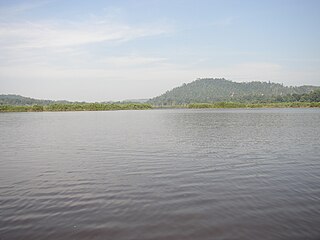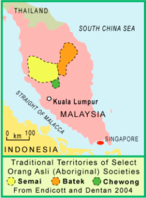
Kelantan is a state in Malaysia. The capital, Kota Bharu, includes the royal seat of Kubang Kerian. The honorific name of the state is Darul Naim. Kelantan is the only state outside of East Malaysia that does not use the term district in its second-level administrative division. Instead, the districts is named as colonies or collectivities and one autonomous subdistrict.

Terengganu, formerly spelled Trengganu or Tringganu, is a sultanate and federal state of Malaysia. The state is also known by its Arabic honorific, Dāru l-Īmān. The coastal city of Kuala Terengganu, which stands at the mouth of the broad Terengganu River, is both the state and royal capital as well as the most populous city in Terengganu. Other major cities and towns includes Jerteh, Kuala Dungun, Chukai, Kuala Berang, Marang, and Permaisuri. At 13,035 square kilometres in size and a population of over 1.2 million people in 2023, Terengganu is Malaysia's 7th largest state by area and 10th largest in population. Terengganu, along with Kelantan, Perlis and the Federal Territory of Putrajaya is one of the most homogeneous states/territories in the country of which 95% of the population are ethnic Malay-Muslims with its own distinct language/dialect, culture, history and tradition.

The Semang are an ethnic-minority group of the Malay Peninsula. They live in mountainous and isolated forest regions of Perak, Pahang, Kelantan and Kedah of Malaysia and the southern provinces of Thailand. The Semang are among the different ethnic groups of Southeast Asia who, based on their dark skin and other perceived physical similarities, are sometimes referred to by the superficial term Negrito.

Orang Asli are a heterogeneous indigenous population forming a national minority in Malaysia. They are the oldest inhabitants of Peninsular Malaysia.

Chini Lake is a lake in Pekan District, Pahang, Malaysia. The lake shores are inhabited by the Jakun branch of the Orang Asli, indigenous ethnic groups of Malysia.

The Batek people are an indigenous Orang Asli people ; belonging to the Semang group, who live in the rainforest of peninsular Malaysia. As a result of encroachment, they now primarily inhabit the Taman Negara National Park. The Batek are nomadic hunters and gatherers, so the exact location of their settlements change within the general confines of the area that they inhabit.

Janda Baik is a village in Bentong District, Pahang, Malaysia. It is about 45 km from Kuala Lumpur and 800 m above sea level. It was estimated to have a population of around 2,820 in 2019.

The Temuan people are a Proto-Malay ethnic group indigenous to western parts of Peninsular Malaysia. They can be found in the states of Selangor, Pahang, Johor, Negeri Sembilan and Malacca. The Temuans are classified as part of Orang Asli group according to the Malaysian government. They are also one of the largest and the most widespread of the Orang Asli ethnic groups.

The 2009 flu outbreak in Malaysia was part of a larger flu pandemic involving a new type of influenza A virus subtype H1N1 virus. As of 11 August 2009, the country had over 2,253 cases, beginning with imported cases from affected countries, including the United States and Australia from 15 May 2009 onwards, and the first identified local transmission on 17 June 2009. From 12 August 2009, the Malaysian Health Ministry said that it had discontinued officially updating the total number of H1N1 cases within Malaysia in line with guidelines issued by the World Health Organization. As of 21 August 2009 the unofficial number of cases reported in the media is 5,876 so far. The first death related to the A(H1N1) virus was reported on 23 July 2009 and so far there have been 78 deaths reported. On 6 July 2009 Malaysia announced that it was shifting from containment to mitigation to tackle the spread of the virus. The federal government had declared a national health emergency in Malaysia because of the A(H1N1) outbreak and was considering imposing a health curfew similar to the week-long shutdown of non-essential services and industries in Mexico.

Al-Sultan Abdullah Ri'ayatuddin Al-Mustafa Billah Shah ibni Almarhum Sultan Haji Ahmad Shah Al-Musta'in Billah is the Sultan of Pahang since the abdication of his father in 2019. He was the sixteenth Yang di-Pertuan Agong (King) of Malaysia, from 2019 to 2024, being sworn in just a few weeks after ascending to the throne as Sultan of Pahang.

The Temiar are a Senoic group indigenous to the Malay Peninsula and one of the largest of the eighteen Orang Asli groups of Malaysia. They reside mainly in Perak, Pahang and Kelantan. Their total population is estimated at around 40,000 to 120,000, most of which live on the fringes of the rainforest, while a small number have been urbanised.
Mintil is an Aslian language of Malaysia. It is considered to be a variety of the Batek language.

Ahmad Faizal bin Azumu, nicknamed Peja, is a Malaysian politician who served as the Minister of Youth and Sports in the Barisan Nasional (BN) administration under former Prime Minister Ismail Sabri Yaakob from August 2021 to the collapse of the BN administration in November 2022, Special Advisor to the Prime Minister Muhyiddin Yassin in the Perikatan Nasional (PN) administration in August 2021, 12th and 13th Menteri Besar of Perak from May 2018 to his first resignation in March 2020 and again from March 2020 to his second resignation in December 2020. He also served as the Member of Parliament (MP) for Tambun and Member of the Perak State Legislative Assembly (MLA) for Chenderiang from May 2018 to November 2022. He is a member, Deputy President and State Chairman of Perak and Pahang of the Malaysian United Indigenous Party (BERSATU), a component party of the PN and formerly Pakatan Harapan (PH) coalitions. He also served as the 2nd State Chairman of PN and BERSATU of Negeri Sembilan from May 2023 to February and January 2024 respectively. He was also the State Chairman of PH of Perak. He was one of the only two state leaders of Malaysia who has led state administrations of two different and opposing political coalitions alongside Mukhriz Mahathir.

The Kingdom of Besut Darul Iman was a historical Malay Kingdom located in the northeastern coast of the Malay Peninsula, precursor of the present-day Besut District and most of Setiu, Terengganu. A principality of Terengganu, the state was established in 1780 following the crowning of a Terengganuan prince, Tengku Kadir as the Raja Palembang Besut. The House of Palembang, a cadet branch of Terengganu nobility continued to rule the territory before it was unified with Terengganu in 1899.

The Sarawak rabies outbreak is an ongoing rabies outbreak in the state of Sarawak in Malaysia. Until 6 December 2022, 49 confirmed rabies cases and 44 deaths have been reported.
Beginning in January 2018, an outbreak of hand, foot, and mouth disease (HFMD) occurred among children nationwide across Malaysia. Nearly 38,000 cases were recorded between January 1 and July 26, and by August 14 the total number of cases had risen to 51,000. Among the states and federal territories affected by the outbreak, Selangor recorded the highest cases with 11,349, Kuala Lumpur with 4,428 and Sarawak with 4,412 cases as reported in July 2018. At least two children in Sarawak and Penang died from complications caused by the virus.
The COVID-19 pandemic in Malaysia was a part of the ongoing worldwide pandemic of coronavirus disease 2019 caused by severe acute respiratory syndrome coronavirus 2. As of 10 February 2023, with over 5 million confirmed COVID-19 cases, a high of approximately 323,000 active cases, nearly 40,000 deaths, and over 66 million tests, the country is currently ranked third in the number of COVID-19 cases in Southeast Asia behind Vietnam and Indonesia, and fourth in the number of COVID-19 deaths in Southeast Asia behind Indonesia, the Philippines, and Vietnam.

The Movement Control Order, commonly referred to as the MCO or PKP, was a series of national quarantine and cordon sanitaire measures implemented by the federal government of Malaysia in response to the COVID-19 pandemic. The orders were commonly referred to in local and international media as "lockdowns".
Hashim bin Aman was a Malaysian civil servant who served as the 7th Chief Secretary to the Government of Malaysia from 1982 to 1984.

On 16 December 2021, a tropical depression made landfall on the eastern coast of Peninsular Malaysia, bringing torrential downpours throughout the peninsula for three days. The resulting floods affected eight states across the peninsula, and left at least 54 dead and 2 missing. During its furthest extent, it caused the concurrent displacement of more than 71,000 residents, and have affected over 125,000 people overall.

















